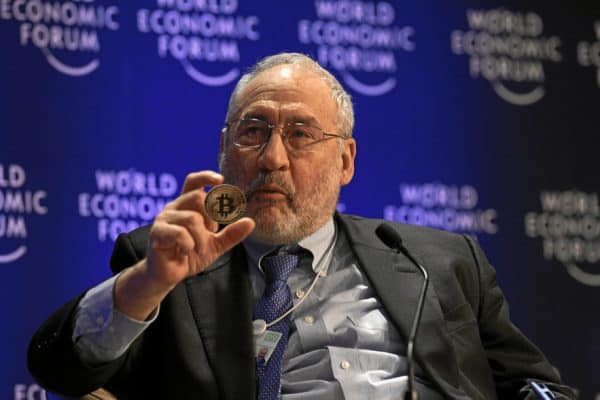
It was recently reported that the former chief economist of the World Bank wants Bitcoin banned, saying “Bitcoin is successful only because of its potential for circumvention, lack of oversight”
You missed something crucial. Because of the ‘McKinsey’ factor. The operative rules (laws of nature from your p.o.v.) changed, so you are stuck in an outdated frame of reference – that is blind to the change and so led to diametrically and demonstrably wrong conclusions.
This hard to describe to anyone who is not yet able to draw back from heuristics fashioned over a lifetime or career of established expertise within the now obsolete paradigm. IE Experts. Even harder for them to grasp – as McKinsey rightly say. In fact, as we shall see, it’s impossible without stepping beyond that paradigm, however briefly.
But let’s point to a couple of factors that are clearly true but contradict, cannot be accommodated in, the obsolete paradigm.
 Whack-a-mole: Bitcoin and Crypto exist in a global space and are a new facts of life for governments. Unless, and until, they are universally outlawed, states that embrace them (and there are an increasing number) will prosper exceedingly to the detriment of those who don’t because of the new freedoms (of movement), velocity and efficiencies they offer. Which opens a global market in a way never before possible.
Whack-a-mole: Bitcoin and Crypto exist in a global space and are a new facts of life for governments. Unless, and until, they are universally outlawed, states that embrace them (and there are an increasing number) will prosper exceedingly to the detriment of those who don’t because of the new freedoms (of movement), velocity and efficiencies they offer. Which opens a global market in a way never before possible.
This has been described as leaving governments and regulators with a game of cosmic whack-a-mole – but it’s much worse (or better – depending on viewpoint) than that. These moles, or rather currencies, are Darwininaly fitter than fiat currencies – and not just because they’re born-global. They’re also faster, more flexible and they lower friction and cost.
They are therefore not 100% percent immune from the actions of governments – but the are effectively so.
China has embarked on a ‘local’ experiment to control the Internet, cryptocurrencies and public blockchain. This is the new isolationism. The USA may follow suit. But if it does like China it will place itself in the global slow lane and the rest of the world will accelerate around them.
Or to put it another was there are now global forces here that are beyond the control of even the biggest big government, even the largest super-state. They can help shape or try to surf them but otherwise the waves, like Canute, will sweep in and over them regardless – unless they can achieve unanimity, or something extraordinarily close to it.
 Benefits
Benefits
“So it seems to me it ought to be outlawed. It doesn’t serve any socially useful function.” Joseph Stiglitz
This is true – but only within the old frame of reference in which governments and regulators are accustomed to thinking, and struggle to surmount.
It’s perfectly feasible to say “this is illegal” provided you add “because we say it is” (and you can make that stick globally). Even to define anyone who builds or uses it as criminals. In other words the point of view of governments.
However democracy, where it operates, not to mention competition, mean that that while governments are able to say this but are subject to a higher power.
This means everywhere, but is easiest to see in cases like Zimbabwe and Venezuela because of the excesses of their governments and manipulation of their central banks. Where Bitcoin is already acting as a de-facto reserve currency because for all its volatility it is authentic volatility – not induced inflation – or (as in the case of less obvious perfidy which is the norm around the world) controlled inflation. Inflation that only goes one way, effectively moving MONEY (the real value behind the currency) out of the hands of the masses, everyone else, who have no choice, and into the hands of those controlling it, and their allies.
Hence it is, emotionally, perfectly reasonable for Jamie Dimon, whose instincts were forged in a world where his like routinely used governments to manipulate markets and to shift ‘value’ (ie MONEY, the real value that is behind money) where he and his allies want it, to feel that the whole game is now fixed. That this is ‘illegal activity’ – because governments make the laws. Hence, his uncontrollable outbursts recently.
 It’s just that now there is another option that is genuinely democratic. That gives the owners of the MONEY (and money) another option. The option to step aside from the inflation game that all governments play, more or less.
It’s just that now there is another option that is genuinely democratic. That gives the owners of the MONEY (and money) another option. The option to step aside from the inflation game that all governments play, more or less.
Exciting as it is for us it is alarming for them. Not least coming after nuclear arms – the global Frankenstein monster that escaped and they still grapple to control. Then the Internet – which they cannot now turn off, or survive without. Now this.
Which is to say while many social benefits (or “socially useful functions”) naturally flow from it’s greater freedoms, integrity (tamper proofing) and efficiencies it’s first and most important role is to shift some of the power away from a global elite of governments and into the hands of the people who actually run, and work in, the economy. Stopping the holes in the buckets and giving people back the money that’s theirs – or rather stopping it being vulnerable to being spirited away without and way to stop that. Democratisation of money – towards making it as fair as it’s assumed and supposed to be.
So obliging all incumbents, from the governments of China and the USA on downwards to pay heed and find a new way to work with the realpolitik – greater control over our own money and so greater democracy.
So whether this is ‘the best thing since sliced bread’ or ‘the end of the world as we know it’ depends on which side of this incumbent divide you live. For one it is the end of the world as we’ve known it – for us it’s the stopping of the holes engineered into our pockets and opens a whole new world of possibilities.
 There’s an old saying: “You can take a horse to water, but you can’t make it drink”. It’s best to remember that incumbents typically have strong disincentives to let go, even for a moment, their cherished assumptions on which their position, power, and wealth are built. Whether consciously or otherwise. IN the light of which that the former chief economist of the World Bank and the Bankster-in-chief are so vocal really does point in the opposite direction to the one they intend – like the policeman waving his arms are the roadside, shouting ‘There’s NOTHING TO SEE HERE’.
There’s an old saying: “You can take a horse to water, but you can’t make it drink”. It’s best to remember that incumbents typically have strong disincentives to let go, even for a moment, their cherished assumptions on which their position, power, and wealth are built. Whether consciously or otherwise. IN the light of which that the former chief economist of the World Bank and the Bankster-in-chief are so vocal really does point in the opposite direction to the one they intend – like the policeman waving his arms are the roadside, shouting ‘There’s NOTHING TO SEE HERE’.
Token Virtues
This still leaves aside all the in-built advantages that cryptocurrencies and – even more – crypto-tokens are clearly able to bring, freeing up value previously trapped in assets, removing fictions and capturing and trading value (not least but not only in data) in new, better, smoother more equitable ways. Creating whole new markets and transforming existing ones. There is here a whole new world of real, not stolen, wealth to be created and explored.
Again this is not good news for most incumbents who’s wealth is acquired via a lock on existing markets and models, which may suffer or be supplanted. But for the rest of us this is perhaps the apotheosis of a ‘socially useful function’. An alternative with both the possibility of at least partially stemming the constant, silent, draining of our resources and creating a new more open economy in which we can all play a part and be rewarded for our efforts. A new start.
What’s not to like?
OPEN LETTER:
Dear Professor Stiglitz
RE: Your recent damning assessment of Bitcoin
You seem to have missed something. In fact I think you’ve missed the point.
Perhaps one or the other of us should get out more but it seems to me that your recent statements about Bitcoin are not just unsustainable in face of the new realities but, forgive me, plain wrong.
Admittedly we probably have different perspectives. I believe that government and economies exist to serve the people who make up those economies. To put it another way I believe in democracy.
Regardless of this the course you advocate would be a catastrophic mistake for governments generally and the USA in particular. A mistake that they are in dire and imminent danger of making.
Perhaps I’m wrong – along with most of those involved in this field and the many thousands of those who use Bitcoin. You are after all the renowned Nobel laureate with a near peerless reputation.
Whether you are right, I am right, or neither this is not purely a matter of academic interest. It’s of vital and pressing interest to the economy of every nation state on the planet.
It should therefore be a matter of open debate.
As a co-chair are of the combined Westminster crowdfunding forum and all party parliamentary group on this and non-bank finance I would therefore like to invite you, and Jamie Dimon who is recently expressed similar sentiments, to attend for a debate on this very important subject at Westminster in the new year.
This has been the main forum for the debate which has resulted in the UK taking an early lead in fintech by advocating support for innovation at all levels including and especially regulation.
We seek not to generate heat but shed light. Not least because the potential for transformative change – or a disaster – is real and imminent.
So I hope that both of you and Mr. Dimon will agree to join me and the forum early in the new year to shed as much light as we can at this crucial point as we move into a new phase of the world economy.
Barry E James
 Barry E James is author of New Routes to Funding, an influential commentator and global thought-leader on Fintech, ICOs, Tokens and Crowdfunding & their innovation & regulation. A serial entreprenur with a deep background in tech and innovation over four decades he advises ICOs, Crowdfunds and Blockchain ventures on strategy. The instigator of the regulatory ‘Innovation Unit’ (and so sandboxes) he is also co-chair of the joint Westminster Crowdfunding Forum and All-Party-Parliamentary-Group. He is co-founder and CEO of TheCrowdfundingCenter and ICONewsDesk which collect and provide data and unbiased analysis.
Barry E James is author of New Routes to Funding, an influential commentator and global thought-leader on Fintech, ICOs, Tokens and Crowdfunding & their innovation & regulation. A serial entreprenur with a deep background in tech and innovation over four decades he advises ICOs, Crowdfunds and Blockchain ventures on strategy. The instigator of the regulatory ‘Innovation Unit’ (and so sandboxes) he is also co-chair of the joint Westminster Crowdfunding Forum and All-Party-Parliamentary-Group. He is co-founder and CEO of TheCrowdfundingCenter and ICONewsDesk which collect and provide data and unbiased analysis.


 Benefits
Benefits